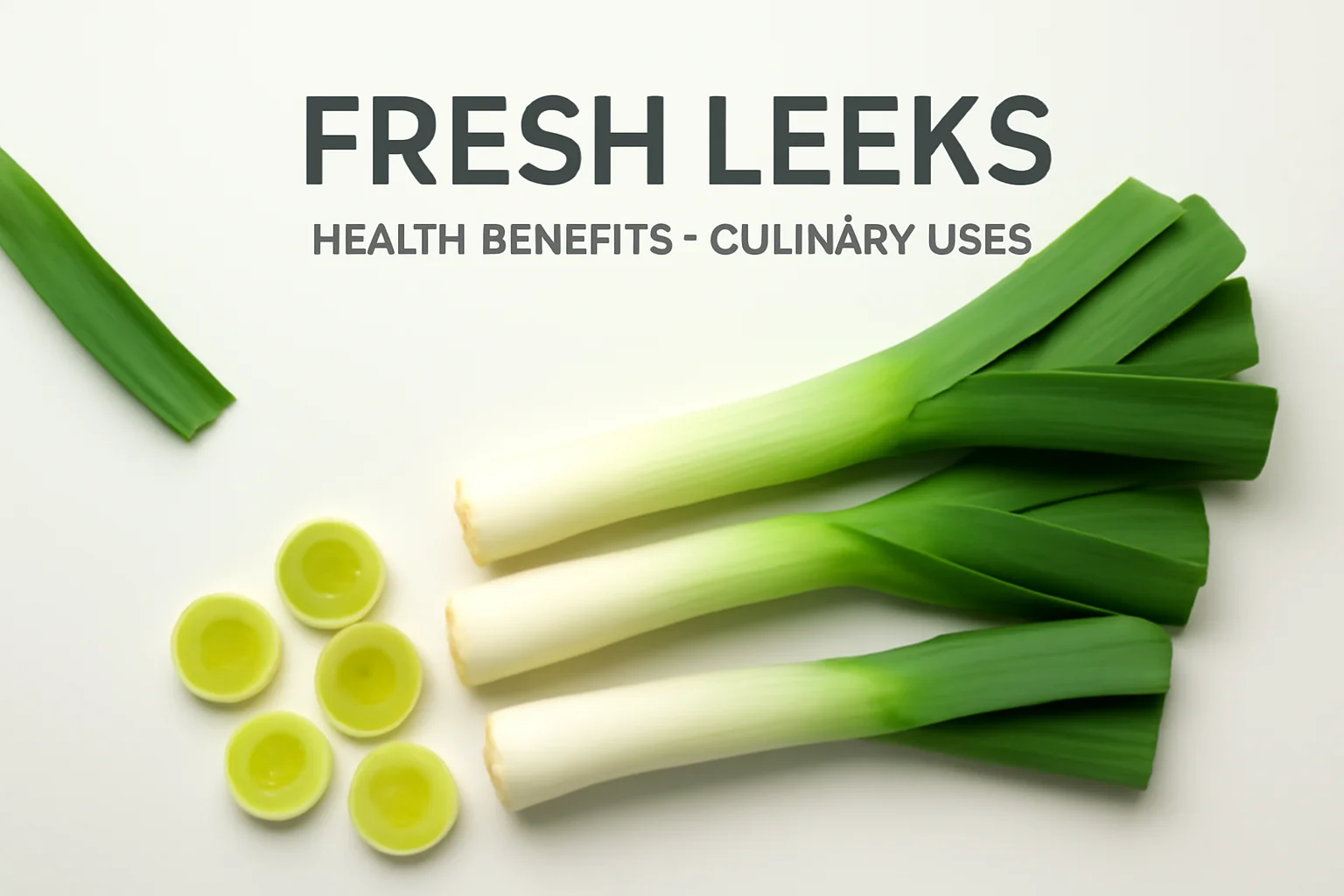
The beneficial effects and uses of leek
The leek, a member of the onion family, is a unique vegetable that is not only delicious but also has numerous health benefits. Used for flavoring and garnishing dishes, leeks are rich in vitamins, minerals, and antioxidants, contributing to our health. Leeks have been part of human nutrition for thousands of years, playing an important role not only in kitchens but also in folk medicine.
Thanks to the versatility of leeks, they can be used in almost any dish, whether it’s soups, salads, or main courses. Their flavor is mildly sweet and soft, making them an excellent complement to other vegetables and meats. Additionally, leeks are available during the winter months, enriching our diet year-round. Below, we present the most important health benefits and uses of leeks so that we can get to know this special vegetable even better.
Nutritional Content of Leeks
Leeks are a nutritious vegetable rich in vitamins and minerals. Key components include vitamin C, vitamin K, folate, manganese, iron, and B vitamins. Vitamin C plays an important role in strengthening the immune system, aids in collagen production, and has antioxidant properties, while vitamin K is essential for blood clotting processes and bone health.
Leeks also contain a high amount of dietary fiber, which promotes digestion and contributes to the health of the gut flora. Dietary fibers help maintain a feeling of fullness, which can be beneficial for weight control. Due to their low-calorie content, leeks can be an ideal choice for those on a diet.
Manganese and iron are also important minerals that aid in supplying energy to cells and transporting oxygen in the blood. Folate is especially important for pregnant women as it contributes to the healthy development of the fetus. Thus, leeks are an extremely nutritious vegetable with many beneficial effects.
Health Benefits
Leeks have numerous health benefits that can contribute to our well-being. One of the most important advantages is their anti-inflammatory effect. Leeks contain antioxidants such as flavonoids and phenolic acids, which help reduce inflammation in the body. This can be particularly useful for chronic inflammatory conditions, such as arthritis or cardiovascular diseases.
Moreover, consuming leeks can contribute to heart health. The antioxidants they contain help regulate cholesterol levels and reduce blood pressure, which can lower the risk of heart diseases. Additionally, leeks stimulate blood circulation, which can help prevent cardiovascular problems.
The digestive benefits of leeks are also noteworthy. The fiber-rich leeks help regulate bowel function, preventing constipation and promoting gut health. Digestive issues such as bloating or heartburn can also be alleviated by regularly consuming leeks.
Leeks in the Kitchen: Delicious Dishes and Recipes
Leeks can be used in a variety of ways in the kitchen, and many delicious dishes can be made from them. One of the most well-known uses is in soups, such as the famous leek soup, which is creamy and flavorful. For this dish, the vegetable is sautéed in butter, then broth and spices are added, and finally blended to achieve a creamy consistency.
Leeks also work wonderfully in salads. Fresh, thinly sliced leeks can be added to green salads, giving a unique flavor and texture to the dish. The taste of leeks harmonizes well with citrus fruits, making them a special experience when served with a lemon dressing.
They are also excellent in main dishes. Popular recipes include potato gratin with leeks or leek pie, as the flavor of the vegetable complements the other ingredients beautifully. Leeks can take center stage or serve as a side dish, for example, steamed or grilled.
Don’t forget that leeks can also be frozen, allowing us to enjoy their fresh taste during the winter months. It is advisable to pre-cook the leeks before freezing them, making them easy to use later in various dishes.
Storing and Buying Leeks
When buying leeks, it’s worth choosing fresh, crisp specimens. Good quality leeks should have vibrant green leaves and a firm, white stalk. It’s best to avoid leeks that are spotted, wilted, or discolored, as these are no longer fresh.
Storing leeks is relatively simple. Fresh leeks should be kept in the refrigerator, in the vegetable drawer, where they can maintain their freshness for up to a week. If you want to store them for a longer period, leeks can also be frozen, preserving their nutrients and flavor.
When using leeks, it’s important to wash them thoroughly to remove any dirt. Sand or soil often hides between the leaves, which should be removed. Leeks are typically used sliced into thin rings or pieces, but they can also be steamed or roasted whole.
Leeks are not only a tasty but also a nutritious vegetable with numerous health benefits. It is worth incorporating them into our diet to take advantage of the benefits they offer.
**Warning:** This article does not constitute medical advice. Always consult a doctor for health issues.

